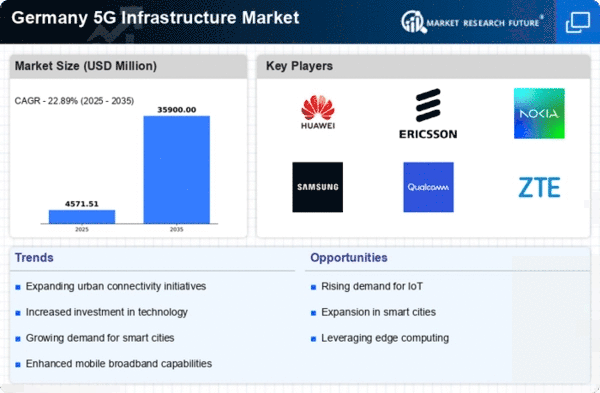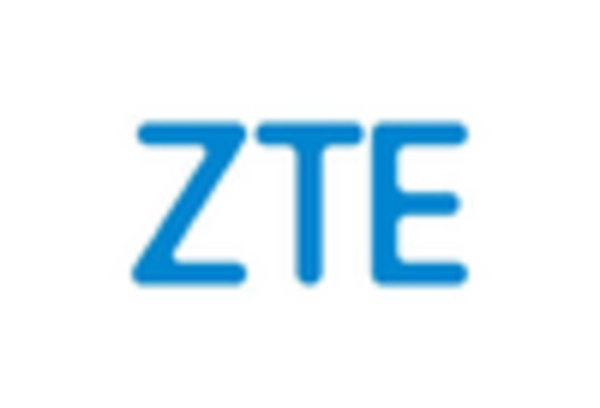Government Initiatives and Funding
Government initiatives in Germany are playing a crucial role in shaping the 5g infrastructure market. The German government has committed to investing €2 billion in the expansion of 5g networks, aiming to enhance digital infrastructure across the country. This funding is expected to facilitate the deployment of 5g technology in urban and rural areas alike, ensuring equitable access to high-speed internet. Additionally, the government has established regulatory frameworks that encourage private sector participation in the development of 5g infrastructure. These initiatives not only aim to improve connectivity but also to stimulate economic growth by fostering innovation and attracting foreign investment. As a result, the 5g infrastructure market is likely to benefit from these strategic government actions, which are designed to position Germany as a leader in digital transformation.
Focus on Enhanced Security Measures
As the 5g infrastructure market expands in Germany, there is a growing emphasis on enhanced security measures. With the increased connectivity that 5g technology offers, concerns regarding data privacy and cybersecurity are becoming more pronounced. In response, stakeholders in the 5g infrastructure market are prioritizing the development of robust security protocols to protect sensitive information and maintain consumer trust. The German government has also introduced regulations aimed at ensuring the security of telecommunications networks, which further underscores the importance of this issue. By investing in advanced security solutions, companies can mitigate potential risks associated with 5g technology, thereby fostering a safer digital environment. This focus on security is likely to influence the growth trajectory of the 5g infrastructure market, as consumers and businesses alike seek assurance in the reliability and safety of their connectivity solutions.
Increased Adoption of Smart Technologies
The increased adoption of smart technologies in Germany is significantly impacting the 5g infrastructure market. As industries such as manufacturing, healthcare, and transportation embrace automation and IoT solutions, the demand for advanced connectivity solutions is escalating. For instance, the implementation of smart factories and connected vehicles necessitates the deployment of 5g networks to support real-time data transmission and communication. In 2025, it is projected that the number of connected devices in Germany will exceed 50 million, further underscoring the need for robust 5g infrastructure. This trend indicates that businesses are recognizing the potential of 5g technology to enhance operational efficiency and drive innovation. Consequently, the 5g infrastructure market is likely to experience substantial growth as organizations invest in the necessary infrastructure to support their digital transformation initiatives.
Competitive Landscape and Market Dynamics
The competitive landscape of the 5g infrastructure market in Germany is characterized by the presence of several key players, including major telecom operators and technology providers. This competition is driving innovation and investment in 5g technologies, as companies strive to differentiate their offerings and capture market share. In 2025, it is anticipated that the market will witness a compound annual growth rate (CAGR) of approximately 25%, reflecting the increasing interest in 5g solutions. Additionally, partnerships and collaborations among industry stakeholders are becoming more prevalent, as companies seek to leverage each other's strengths to accelerate the deployment of 5g infrastructure. This dynamic environment is likely to foster a culture of innovation, ultimately benefiting the 5g infrastructure market as new solutions and services emerge to meet evolving consumer demands.
Rising Demand for High-Speed Connectivity
The demand for high-speed connectivity in Germany is driving the 5g infrastructure market. As businesses and consumers increasingly rely on digital services, the need for faster and more reliable internet connections has become paramount. In 2025, it is estimated that mobile data traffic in Germany will reach approximately 5.5 exabytes per month, indicating a substantial increase in demand. This surge is likely to compel telecom operators to invest heavily in 5g infrastructure to meet consumer expectations. Furthermore, the proliferation of smart devices and IoT applications is expected to further fuel this demand, as these technologies require robust connectivity solutions. Consequently, the 5g infrastructure market is poised for significant growth as stakeholders respond to the evolving landscape of connectivity needs.
















